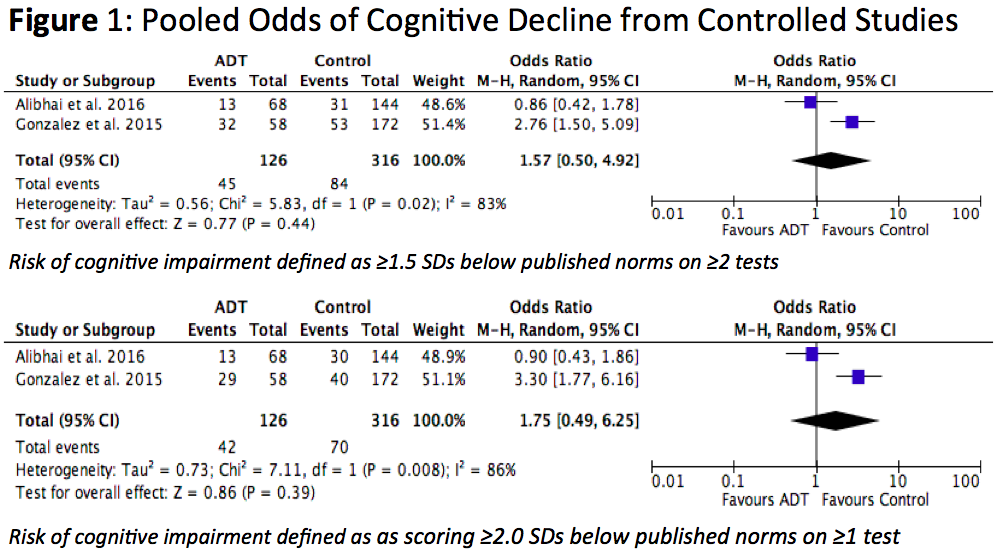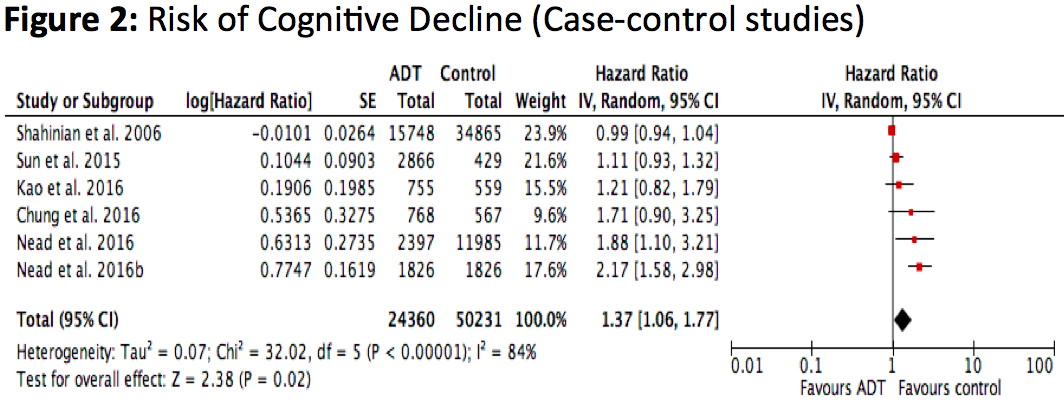| NEAUA Main Site | | | Past & Future Meetings |
|

|
Adverse Effects of Androgen Deprivation Therapy on Cognitive Function and Dementia in Men with Prostate Cancer: A Systematic Review and Meta-Analysis Alexander P. Cole, MD1, Maxine Sun, PhD2, Nawar Hanna, MD1, Toni K. Chouiri, MD3, Quoc-Dien Trinh, MD1. 1Brigham & Women's Hospital- Division of Urological Surgery, Boston, MA, USA, 2Brigham & Women's Hospital- Center for Surgery and Public Health, Boston, MA, USA, 3Dana-Farber Cancer Institute, Lank Center for Genitourinary Oncology, Boston, MA, USA.
Background: Use of androgen deprivation therapy (ADT) for prostate cancer has many well-known side effects. ADT may confer a higher risk of cognitive impairment. Published results are variable and lack consensus. Our objective was to perform meta-analysis of the risk of overall cognitive impairment in men receiving ADT for prostate cancer. Methods: Relevant studies were identified through the search of English language articles indexed in PubMed, Medline, PsycINFO, Cochrane Library and Web of Knowledge/Science until December 21st2016. Articles were included if they were published in English, reported on original research with adult male subjects undergoing treatment for prostate cancer, incorporated longitudinal comparisons, and included a control group. Controlled intervention studies were required to assess an established cognitive-related endpoint that was measured by a validated instrument, and measure cognitive impairment based on the International Cognition and Cancer Task Force (ICCTF) criteria. The effect of ADT on cognitive impairment was pooled using a random-effects model for controlled intervention and case-control studies separately. Results: Of 221 abstracts, 25 were selected for full-text review, and 8 studies, with 2 controlled studies and 6 case-control studies were identified. Overall cognitive impairment was not significantly different when the results of the 2 prospective studies were pooled (OR: 1.57, 95% CI: 0.50-4.92, P= 0.44), with significant heterogeneity between estimates (I2: 83%). In retrospective data, the odds of developing any cognitive impairment were significantly higher in men treated with ADT (HR: 1.37, 95% CI: 1.06-1.77, P= 0.02), with considerable heterogeneity (I2: 84%). Conclusions: The relationship between overall cognitive impairment and use of ADT defined according to the ICCTF criteria in a pooled-analysis of two prospective studies was inconclusive. Although retrospective studies suggest a higher risk of overall cognitive impairment after ADT, we caution readers not to over-interpret this finding given the limitations of retrospective data. Better well-designed prospective studies are needed to assess the effect of ADT on cognitive impairment with long-term follow-up. Back to 2017 Program |
|
Photos courtesty of Old Port of Montréal © Tourisme Montréal, Stéphan Poulin.




